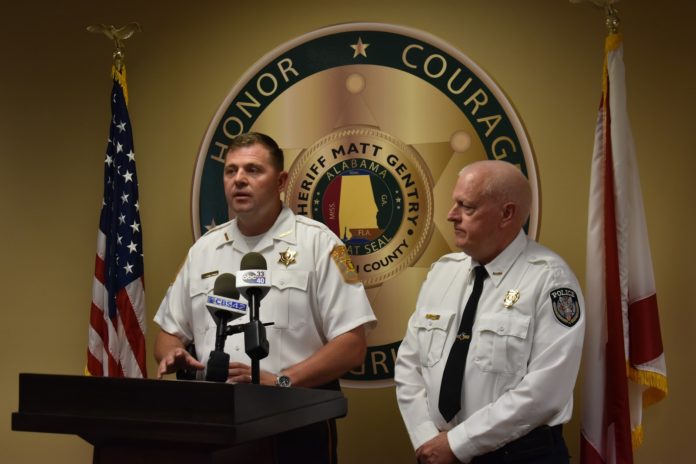
CULLMAN, Ala. – According to leaders of Cullman area emergency response agencies, the city and county are about ready for Rock the South next week. When the music cranks up on May 31, around 190 law enforcement officers and at least 50 firefighters and emergency medical personnel will be at the new site, working out of a mobile unified command center to monitor traffic and weather, as well as the welfare (and behavior) of concertgoers. Special attention will be paid to traffic flow all the way from interstate exits to the venue (1872 County Road 469), and law enforcement officers will be assigned to make sure that local residents feel as little impact as possible.
In addition to fire/EMS and law enforcement, several other agencies will bring their expertise to the event. Inspectors from the Alabama Department of Public Health (ADPH) will make sure food vendors keep food safe, and staff from the National Weather Service Huntsville (NWS) office will be onsite with their computer systems to keep an eye on weather all around the venue and alert other agencies immediately if a threat is detected on the horizon.
Law enforcement: security, traffic and alcohol boundaries
On Tuesday afternoon, Sheriff Matt Gentry and Cullman Police Chief Kenny Culpepper held a press conference (https://www.facebook.com/CullmanTribune/videos/486106355263067/) at which they laid out elements of the security plan for the event and site. Gentry announced that, since the event site is surrounded by unincorporated county property for the first time, the sheriff’s office will concentrate on security around the outside perimeter and along traffic routes.
Gentry assured residents around the site that his office will pay special attention to their needs, saying, “We’ll have deputies at intersections that will be working with the citizens of the community, who live on those roads, to get them home safely, to get them home in an expedient time, and also working with the individuals that’s coming to the festival, to Rock the South, to ensure that they get to the right place in the right location, where they’re parking, and those kind of things, because, for us, our main goal and focus is to ensure that all citizens and the citizens of our community are safe, and do that in a safe manner.”
Culpepper noted that the security team will include state troopers and personnel from several other north Alabama law enforcement agencies, coming through a regional mutual aid agreement. Taking all potential threats seriously, local authorities have also brought in the Alabama Fusion Center, a division of the Alabama Law Enforcement Agency which performs multiple tasks related to critical infrastructure, AMBER Alerts, rural crime, cybercrime, terrorism, narcotics, gangs, missing children and human trafficking.
Culpepper told reporters, “We’re very familiar with what goes on inside the venue because, like the sheriff said, we’ve been doing this about seven years, so we’re familiar with that. The only difference this year is that where our footprint inside has grown from about 15 acres to about 190 acres. We’re going to have some extra stuff that we’re going to have to police and patrol, so it is going to be an all-hands-on-deck event.”
Special notes included:
- Detention deputies will staff an onsite detention and booking center. People who misbehave to a criminal degree can be arrested and processed right there.
- Law enforcement will use ATVs to move quickly around the venue and to check on area residents. Medical personnel will also use ATVs to provide rapid response and emergency transport.
- Since the site is within the city–which is wet–but all surrounding property is in the still dry county, alcoholic beverages will be allowed only within the venue footprint. Anyone found with alcohol on surrounding roads or other outside areas will be arrested, according to the sheriff.
- Local residents will have passes to allow them unhindered access to their neighborhoods. Officers will only allow people with those passes into those areas.
- In order to maintain access for emergency vehicles, visitor parking will be in designated areas only. Cars parked along roads or on private property will be towed, according to Culpepper.
Fire and medical: safety and immediate response
Cullman Fire Rescue (CFR) Chief Bradberry told The Tribune, “We coordinate with numerous agencies to do that. Of course, it’s our responsibility- the fire and EMS part, but we definitely coordinate with all the local ambulance services. We try to reach out to the state agencies: ADPH, North Alabama Healthcare Coalition- I know we talked to them- and then ADPH regional coordinator will be there onsite, too. So we try to bring in multiple agencies; we request help from all around the state, in fact.
“Like I said, it’s a joint effort on the fire and EMS side of it. But it just takes a lot of coordination, a lot of pre-planning. We certainly get with the hospital on a lot of this and, statewide, we try to alert all the hospitals and even the Division F Response Team (a north Alabama-based multi-agency organization made up of various types of emergency responders). They may want them to know what we’ve got going on, and that way, if we do need help, you know, we have some help we can get coming that way.”
The fire/medical response team includes CFR, the Bethsadia Volunteer Fire Department, and the Good Hope Fire Department, with support from numerous other agencies including Cullman EMS and other ambulance services, Air Evac Lifeteam, Cullman Regional, Wallace State’s EMT and nursing programs and many others.
According to Bradberry, many other municipalities trying to figure out how to handle large community events will send volunteers to help out in exchange for advice and experience they can take back home. In all, the chief estimated that at least 50 fire/medical personnel will be onsite at any given time during the event, and he believes that the number represented a very conservative estimate. They will use ATVs to transport patients to the large medical tent that is equipped to function as a mobile emergency room, or to ambulance pick-up points. A landing zone for police and medical helicopters has also been designated at the site.
Said Bradberry, “We’ve done this quite a few years, so by trial and error and a lot of planning, we’ve gotten better at it, for sure.
“I would like to say, every year, each and every year, everybody works together great for this. Our department, our guys do a wonderful job. The folks that we work alongside- I’d hate to try to name them all, but there’s a ton of them- they do a great job. It really is a big team effort, and I would say that it’s a big on-taking, but it also brings us together as responders in our community, so it really helps us to coordinate, work well together, and do these type things, and prepare like we do and plan like we do. It really just helps you overall for public safety.”
EMA: watching the weather, planning for the worst possibilities
Cullman County Emergency Management Agency (EMA) Director Phyllis Little keeps in touch with NWS regularly, even this far ahead of the event. She reported the long-term forecast currently looks good: warm with a 10-20 percent chance of rain each day.
Said Little, “Just a typical summer day.”
Since Heritage Park (the old location) had to be evacuated due to lightning two years ago, NWS pays special attention to the dangerous weather phenomenon and the kinds of storms that produce it. They will be in the multi-agency command center, monitoring current weather and weather systems headed toward the site, both in real time. If a bad storm is coming, or if a lightning strike hits close, they will be able to tell immediately the direction of the storm and make educated predictions about how the storm might affect the venue.
EMA is coordinating with agencies like NWS, the Fusion Center and others to prevent or respond to both natural and man-made disasters including, according to Little, “doing a safety plan for- God forbid- mass casualties.”
Watch the heat, watch the alcohol
Both Bradberry and Little talked to The Tribune about heat dangers at RTS, and all involved agency heads talked about issues related to alcohol consumption. EMA and NWS will monitor heat from the weather end and will keep responders aware of what is happening, and medical personnel are making special preparations to deal with large numbers of people suffering heat exhaustion and those facing more dangerous heatstroke.
Little reported that event coordinators, who have installed misters in the woods on the southwest side of Heritage Park during previous RTS events, will contend with less shade at the new venue by placing misters under canopies this time around.
Agency leaders appealed to visitors to be responsible about alcohol consumption: to stay hydrated with water, limit alcohol, make use of pre-appointed designated drivers and keep all alcoholic beverages within the venue.
Culpepper said, “The object is to come and have a good time, and not overdo it and have any kind of issues.”
Gentry added, “We want the community to be safe. We want the participants coming to Rock the South to have a good time. Enjoy the festival, but be safe while doing it. Be responsible. And that’s what we’re looking at. We’re there to assist them getting to and from the event, and also to protect the residents in those areas, because it is going to be different.”
Copyright 2019 Humble Roots, LLC. All Rights Reserved.




























